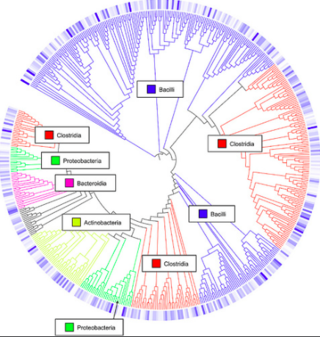Depression
Probiotics for Depression
A randomized controlled trial shows some promising results
Posted February 21, 2016

A few weeks ago the first video in our monthly series with Dr. Drew Ramsey came out on Medscape Psychiatry, discussing some of the highlights of brain food and the microbiome from research in 2015. Some interest expressed in the comments focused on one of the last studies we mentioned, published late in the year in the journal Nutrition: “Clinical and metabolic response to probiotic administration in patients with major depressive disorder: A randomized, double-blind, placebo-controlled trial.”
There are a number of fascinating things about this paper, which to my knowledge is the first trial of probiotics in people with major depressive disorder specifically looking at biomarkers of inflammation and depressive symptoms. 40 patients total so not huge, but bigger than most pilot trials. They used three strains of probiotics in a capsule (Lactobacillus acidophilus, Lactobacillus casei, and Bifidobacterium bifidum, two billion colony forming units of each), and checked not only records of diet, but also serum glucose and other measures of metabolism along with a lab test that looks at inflammation called C reactive protein.
Probiotics are anti-inflammatory microbes that seem to affect the gut in a positive way, decreasing stress signaling in the body and possibly even increasing the transformation of the amino acid tryptophan to serotonin in the brain. In both their anti-inflammatory capacity and their serotonin capacity, probiotics have *some* overall effects similar to antidepressants such as SSRIs, but so far I’ve seen no literature to suggest that probiotics could cause problems such as serotonin syndrome, anxiety, jitteriness, or an increase in suicidal thoughts, or an uncomfortable discontinuation syndrome that SSRIs can sometimes cause when stopping the medication too suddenly.
After eight weeks, depression scores were significantly reduced in the probiotic group compared to placebo along with lower plasma insulin measures and C reactive protein, though diet and weight were not significantly different between the groups or at the beginning and the end of the trial. This meant the probiotic seemed to decrease measures of inflammation along with symptoms of depression, and perhaps began to influence the metabolism positively.
A limitation of the paper is no mention that I could find if the patients were in other treatments at the same time, such as psychotherapy or medications, nor was any mention made of presence or absence of side effects, but compliance with the placebo or probiotic was listed at over 90%. And, as mentioned before, the overall trial was relatively small.
Prior studies of humans have shown decreases in anxiety in various situations, and in healthy controls, some interesting randomized findings such as decreases in negative thinking. A 14 week study of probiotics in schizophrenia showed no effect.
My next video blog at Medscape Psychiatry will cover the basic mechanisms of why we think probiotics, as unexpected as that might be, may be important to the future of mental health care treatment, or at least a valuable addition to the current armamentarium. While it’s easy to get excited about a possible effective intervention for mental health that would also be good for the body at large and have few side effects, larger trials will need to be done before any evidenced-based recommendations can be made. Since many folks with irritable bowel syndrome also have anxiety and depression and the evidence base for the treatment of IBS is large, it makes sense to try probiotics if you have symptoms of both irritable bowel and depression or anxiety. The three strains of probiotics used in the trial are used extensively in formulations for irritable bowel as well.
I would like to see trials of probiotics combined with fiber to feed them, or trials of probiotics during a low FODMAP diet (a specific type of diet that can starve the microbiome, potentially killing pathogenic strains while the probiotics are taken to fill in the gaps with friendly microbiota) followed by gradual reintroduction of fibers with the probiotics in people with irritable bowel, anxiety, and/or depression. Trials with different doses of probiotics and of course different strains would also be interesting.
In the mean time I’ll be sure to keep an eye on pubmed to see what new information comes along about probiotics, but also other lifestyle and complimentary interventions for mental health.
Image credit: Flickr creative commons
Copyright Emily Deans MD


